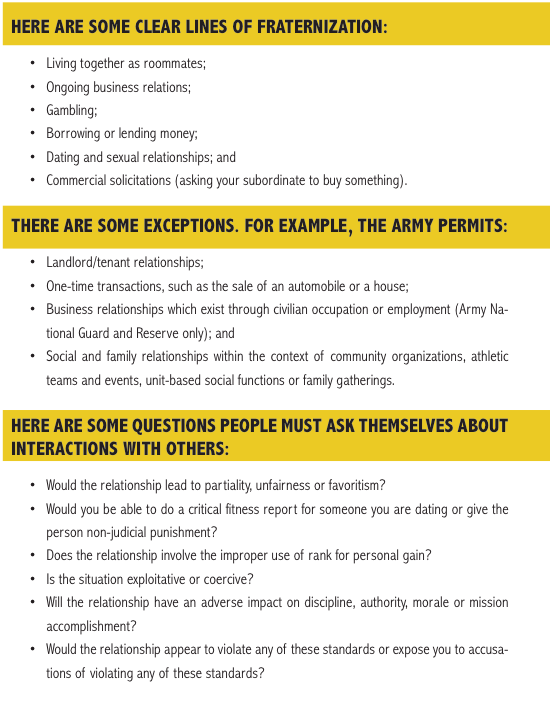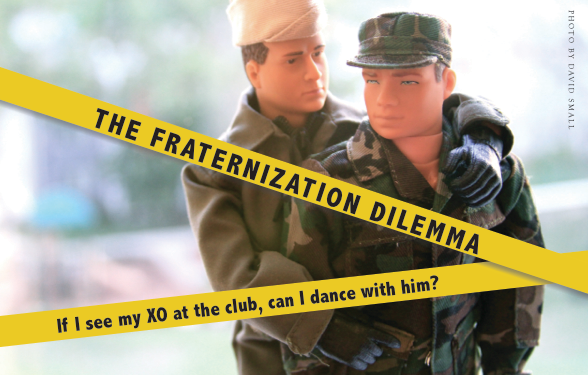The Fraternization Dilemma
If I see my XO at the club, can I dance with him?
 After repeal of “Don’t Ask, Don’t Tell” (DADT), service members face a brave new world of open service. Until Sept. 20, 2011, being gay in the military was like being in an illegal private club. You can no longer be separated for saying you are gay, but you now face a new set of potential problems. DADT repeal changes the social environment of gay life in the services and requires a fresh look at that uniquely military crime of fraternization.
After repeal of “Don’t Ask, Don’t Tell” (DADT), service members face a brave new world of open service. Until Sept. 20, 2011, being gay in the military was like being in an illegal private club. You can no longer be separated for saying you are gay, but you now face a new set of potential problems. DADT repeal changes the social environment of gay life in the services and requires a fresh look at that uniquely military crime of fraternization.
The services criminalize improper or unduly familiar relationships between officers and enlisted people under Article 134 of the Uniform Code of Military Justice. Officers commit the crime when he or she consorts with enlisted people and that conduct affects good order and discipline.
Enlisted folks can also get in trouble for orders violations as the services have instructions regarding improper relationships.
The courts have upheld this military caste system as necessary as these prohibitions have been seen as a way to avoid compromising the chain of command. In the contemporary military, with more women having entered the ranks, fraternization has increasingly become about dating and sex with subordinates.
Confounding, though, is the fact that each service has slightly differing approaches. The Navy prohibits relationships between chief petty officers and ranks E-1 through E-6. The Air Force includes relationships with civilians and contractors even.
Interpretations vary too. The Air Force says an occasional round of golf could remain professional, but daily or weekly activities could result in the perception of an unprofessional relationship. Thus, the Air Force might question playing in a softball league with subordinates because of the regular contact in the social realm.
 The Army has a slightly different take. The Army would allow playing with subordinates in the league but disapprove of regularly socializing after the games.
The Army has a slightly different take. The Army would allow playing with subordinates in the league but disapprove of regularly socializing after the games.
The Marines put it simply: relationships between officers and enlisted must always reflect the difference in rank.
For all the services, certain other relationships are prohibited without regard to rank, such as recruiters–recruits or trainers–trainees. Consider the recent scandals involving seven trainers at Lackland AFB, Texas, who have been charged, some already convicted, for sexual misconduct.
Some of the problems are easy to weed out. You won’t be dating subordinates, which is axiomatic. In general, you are allowed to be around other service members in common community events, command events and the kinds of morale-building projects that include everyone. You can go to the same church or run the Mud Run. Everyone in the unit can go to the restaurant together, or the entire section can get pizza to celebrate the completion of an important mission. But, activity that sets individuals or select groups apart from others should be avoided.
What about “friending” someone on Facebook? Social media is dangerous territory, when in doubt, consult your JAG or SLDN.
All of these rules are designed to prevent favoritism, exploitation or the appearance of those improprieties. For the LGBT community, rules about fraternization do not change by the gender of those involved in the interaction. So, dating someone of the same sex or opposite sex is evaluated by the same rules.
All the services will permit a relationship when one spouse of a recognized married couple is commissioned after the marriage. However, because the federal Defense of Marriage Act bars recognition of LGB marriages for any reason, this marriage accommodation isn’t an option for gay service members and their spouses.
These rules sometimes may not appear to be enforced because the regulations are either stretched or ignored in minor day-to-day interactions. How often do officers and enlisted throw a few dollars into a football pool, or get a small amount of money from another to buy a latte at the coffee shop, or buy or sell those Girl Scout cookies? Arguably, these minor issues are not detrimental to good order and discipline, but they are examples of potentially problematic relationships.
In the relatively small gay community, the boundaries still need to be maintained, and this is a challenge.
No, your superior or subordinate cannot be your confidant about your recent break up, even if he is the only other gay person around. The burden of having few of your LGB peers serving with you can be difficult. This is the case for all minorities in the services. Social interactions will be limited by the small numbers of your compatriots, as well as your rank. That is the reality of gay military life.
How does anyone determine if a relationship is improper? Be certain you have read and understand the regulations for your service. Because each service has slight differences in their regulations and cultures, you must be aware of how these regulations are applied in the real world. If you have to ask if the relationship is improper, that is the first indication of a potential problem. Would you feel free to tell your commander about the relationship? If not, it is probably improper. Fair or not, if you are gay in the military, there will be eyes on you. You owe it to yourself to make sure that you don’t carelessly throw away your career.






